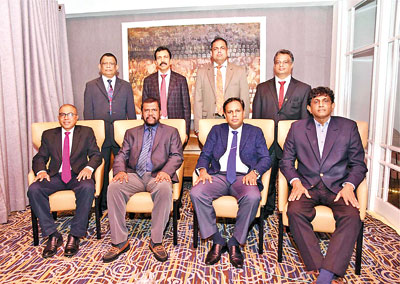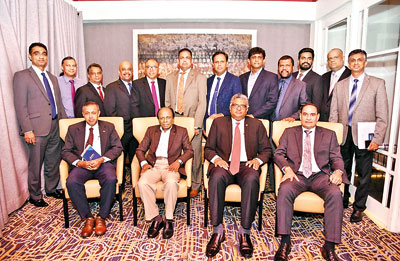SLANSHEI holds AGM & Panel discussion
View(s):Sri Lanka Association of Non-State Higher Education Institutes (SLANSHEI) is an umbrella organization formed with the initiation of seven leading institutes coming together to address the needs of the non-state higher education sector in the country in the year 2016.

The association was established with the overall mission of working for the betterment of higher education in Sri Lanka and providing a wide range of relevant and quality education opportunities to a broader cross section of the Sri Lankan society.
The seven founder members of the Association are Sri Lanka Institute of Information Technology (SLIIT), CINEC Campus, Horizon Campus, Asia Pacific Institute of Information Technology (APIIT), The Institute of Chartered Accountants of Sri Lanka (CA Sri Lanka), South Asian Institute of Technology and Management (SAITM) and Aquinas College of Higher Studies.
Apart from these founder members, Saegis Campus, KAATSU International for Undergraduate-studies (KIU), Gateway Graduate School, International Institute of Health Sciences (IIHS), Sri Lanka International Buddhist Academy (SIBA Campus), Business Management School (BMS), ESOFT, Sanasa Campus and Northshore International Campus are other members of SLANSHEI.
SLANSHEI held its Annual General Meeting and elected following new members for the year 2020/2021.
President : Mr. Upul Daranagama, Horizon Campus
Hon. Secretary : Prof. Colin N. Peiris, SLIIT
Vice- President : Prof. Veranja Karunaratne, CINEC
Treasurer : Dr. Kithsiri Edirisinghe, IIHS
Immediate Past President: Prof. Lalith Gamage, SLIIT
Elected Members: Mr. Bandara Dissanayake, Saegis Campus
Mr. Pradeep Alexander, CA Sri Lanka
Mr. Gamindu Hemachandra, APIIT
Dr. Indrapala Chandrasekaram, KIU
The newly elected President, Mr. Upul Daranagama in his welcome speech emphasised on the importance of increasing the quality of the degree programmes offered by the Non-State higher education division, thereby produce skill-full employable graduates suitable for the local and international job market. The members gave their inputs to plan strategically to get enrolled foreign students to the degree programmes conducted in these institutes.

The AGM was followed by the panel discussion organised by SLANSHEI with the participation of over 50 attendees from the education sector, industrial partners and other supportive parties. The three panellists and the moderator were eminent persons in the education sector of Sri Lanka; Prof. Kapila Perera, Secretary, Ministry of Education, Dr. Upali Sedere, State Secretary for Education Reforms, Open University and Distance Learning and Prof. Sampath Amaratunge, Chairman, University Grants Commission. The session was moderated by Prof. Lalith Gamage, Immediate Past-President of SLANSHEI.
The panel discussed about the relevance of subjects in the primary and secondary education towards the discipline of higher education. Prof. Kapila Perera highlighted the importance on generating the urge to learn in the academic environment. ‘The quality of the teaching methodology needs to be improved to create an enthusiastic learning atmosphere. The focus to produce quality labour force with a high skill level should be initiated from the primary education’ Prof. Perera stated.
‘The education system should be reformed in order to produce graduates with skills such as critical thinking, problem solving etc’ Dr. Upali Sedera added to the discussion. Furthermore, he emphasized that the resources should be made available for the students in rural areas as well, and the tertiary educations should motivate students to be entrepreneurs in the future to contribute the growing economy of Sri Lanka.
He highlighted that Sri Lanka is considered as a country with a high literacy rate amongst the other countries in the Asia for primary and secondary education, even though, the higher education system needs to be revamped as it is not in par with the globally accepted standards.
The university entry methods need to be reconsidered to accommodate talented youth in the future. Education at each level, from higher education to tertiary or vocational have to inculcate the concept of contributing to the economy of the country, Prof. Sampath Amarathunge added to this.
The final discussion was about the future reforms in the entire spectrum of education, as this was highlighted in the vision statement of His Excellency President Gotabaya Rajapaksha.
The panel discussed the important role of Non-State higher education institutes who cater the growing demand of the tertiary education.
Mr. Daranagama thanked the speakers for their valuable time and insights given during the discussion. Moreover, he stated the need of higher education to compete as a growing nation to move forward. ‘International schools produce approximately 10,000 students per annum who are fluent in communication in English, however, there is no pathway to absorb them to the state universities in Sri Lanka, which ultimately results in outflow of knowledge and foreign exchange.’
He requested the speakers to reconsider the possible entry pathways for these students in order to retain them in the country, thereby save foreign exchange.


